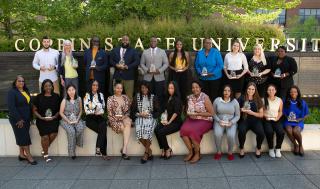Academic Advisement in the General Education Requirements
Am I required to complete general education requirements (GERs)?
Yes, everyone must complete 40 or 41 credits of general education requirements to reach the 120 credit hours needed to earn an undergraduate degree. After the 40/41 credits are completed, students will continue taking courses in the degree program as well as electives. Contact departmental advisers to obtain a current plan of study.
Is there a Plan of Study for the General Education Requirements?
Yes. General education requirements are taken during the first and second years of matriculation.
How much time does it take to complete my GERs?
The general education requirements are designed for completion in three semesters and a summer OR four full-time semesters.
Are general education requirements included in my degree plan?
Yes. All of the general education requirements are included in degree plans and, in some cases, such as Nursing, Social Work, and Education must be completed before the degree core of courses can be attempted.
Suppose I know that I cannot take courses together as recommended by the First Year Experience Academic Adviser, what can I do?
Course selections are based on several factors such as employment, family responsibilities, hours needed for study and research, as well as mode of instruction. Therefore, students have the flexibility of choosing the right combination of courses to meet their needs; however, students must complete general education requirements by the end of the second year of matriculation.
If I need to repeat a course should I repeat that course at Coppin?
Absolutely! When courses are repeated at Coppin students receive the benefit of the new grade and its quality points. Quality points are used to compute the grade point average.
I am working to complete courses ahead of schedule, how do I obtain permission to attend another college?
If the desire is to attend a community college or other local university that is not a member of the University System of Maryland students are required to obtain the permission form in the department at Coppin where the course is taught. For example, Philosophy is taught in the Department of Humanities, therefore, students should go to the Department of Humanities which is located in the Grace Hill Jacobs Building in room 530.
Can any FYE Academic Adviser help me with my course selections?
Absolutely! Although each student is assigned to an FYE Adviser to support efficient delivery of services students will be offered the opportunity to consult with another adviser if their assigned adviser is not available when they visit the office.
If I need a permission code for a general education requirement can I obtain it in the First Year Experience main office?
Absolutely! Advisers are able to request permission codes for courses that are filled and do not have waiting lists and will issue the permission code through Coppin email as soon as it is obtained.
Should I wait until I complete all general education requirements before I get involved with the department where I major?
Absolutely not! In fact, and because of general education requirements come out of academic departments, they are students' first exposure to a degree program. Academic department faculty and staff welcome questions and inquiries about their degree programs.
When is the FYE Academic Advisement office open?
The First Year Experience and all of its resources are available to students Monday through Friday beginning at 8:30am. The Writing and Math Centers stay open as late as 6:30pm during specific times of the academic year. Call 410-951-3555 or 410-951-3508 for scheduling information.
What other kind of help can I find in the First Year Experience department?
In addition to academic advisement and tutors who help with writing essays, reading, and writing research papers, various mathematics courses including statistics, and selected science courses students can also join the First Year Experience Student Steering Committee (SSC). The FYE Student Steering Committee act as advisors to the Director of University College, generally, the First Year Experience Program specifically. Their experiences obtaining services on and off campus, degree completion support, and partnerships which enhance the undergraduate journey are invaluable and influence program planning for University College and all of its programs. Applications for membership in the FYE Student Steering Committee are available in the FYE main office which is located in Grace Hill Jacobs Building-Room 208. The office opens at 8:30am and closes at 5:30pm. Arrangements for services after 5:30pm can be arranged by visiting the main office or by calling 410-951-4154.



